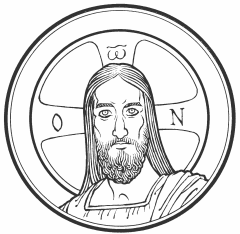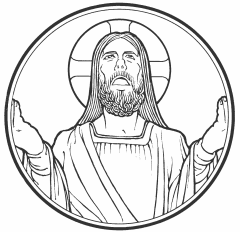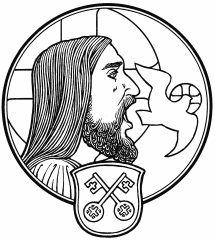Grace, mercy, and peace to you from God our Father, and from our Lord and Savior, Jesus Christ, amen. The text for the sermon is the Epistle, which was read earlier.
What makes a person popular? Is it the clothes they wear? Is it what they say or do in their lives? Is it the way they look? Popular people tend to become popular because of some achievement in their lives. Once a person becomes popular, they tend to amass some sort of following, what we call fans. But should that popular person slip up and say or do something out of character, they lose their popularity and some of their followers. As we turn to today’s Epistle, we see that Jesus suffered the same fate, losing popularity amongst the people.
Paul was amazed and astonished that the Galatian church was so quickly deserting the Gospel. Paul had recently been with them at the start of his second missionary journey. He had strengthened them with Gospel preaching and teaching. It seemed that all was well, and he moved on to new places, spreading the Gospel of Jesus Christ. But barely beginning his work in Corinth, the bad news came from Galatia: they were deserting the One who had called them by Christ’s grace and were turning to a different gospel!
As bad as things were in Galatia, Paul had not written off the Galatians. They had not yet totally and completely rejected the Gospel of Jesus Christ. Paul is letting them know that they are flirting with something very dangerous by listening to a message that is contrary to that of Jesus Christ. They are listening to a message that downplays the grace won for them by Jesus Christ. He reminds them that it was grace that moved Christ to give Himself for their sins. They had been rescued but now were in danger of reverting to being captives to their sin. They had been freed but now they were toying with the idea of giving up their liberty from sin, even giving up the Gospel itself!
For one reason or another, Jesus Christ and His message of salvation were no longer popular among the Galatians. Unfortunately, Jesus Christ and His message of salvation is no longer popular among us today either. We are quick to turn away from Jesus Christ and latch onto the latest and greatest fad of salvation, to have that fad replaced with another fad to have it replaced with another fad. At the end of the day, we’re left with fads that leave us empty and looking for more.
For the Christian faith, Jesus is more than just a passing fad. In “this present age,” as St. Paul speaks of, there are many philosophies of the world that will promise salvation. If one avenue of salvation doesn’t do it for you, then pick another one that will better fit your wants or needs. For us, we need rescue from the false ways of salvation and a return to Jesus Christ, the sole means of our salvation. That was the case for the Galatian church and that is the case for the church of today as well. We need rescue from our contemporary evil age with its confusing and seductive claims to truth, propagated by deceptive false religions such as Mormons, Jehovah’s Witnesses, New Age religions and the like. We need rescue from the easygoing selfhelp gospels which appeal to the passions and appetites of the flesh. We need rescue from the wide-spread philosophy of materialism, success and other emotional appeals. But namely, we need rescue from the penalty of our sins. The penalty that we deserve is death. However, when we turn to the false means of salvation, sin no longer is talked about, matters, or is even an issue.
Paul made a point to the Galatian church that has been lost on today: “If anyone is preaching to you a gospel contrary to the one you received, let him be accursed.” Paul here uses some very strong language with regards to those who preach a gospel other than that of Jesus Christ. He says that they should be anathema, that is, cut off and treated as an outsider. He doesn’t merely mean treated as an outsider from the community, but rather as an outsider of Jesus Christ. This person does not receive the gifts that the Christian does, that is, the gift of eternal life. The reason that Paul makes such an emphasis of this point is that the work of the false preachers are not only undermining the Gospel of Jesus Christ, but it also leads Christians into doubting the promises of God through Jesus Christ and a falling away of the faith into the false preaching that was prevalent of the day in Galatia.
Unfortunately, Paul’s warning is not as strong today as it was in his day. False gospels of the day are a dime a dozen and we have no problem buying into any or all of them, all at the expense of our salvation. The false preaching and preachers of the day are slick and sound good, promising us great earthly blessings. What you don’t hear or what you hear very little of is Jesus Christ. That fact should raise red flags for us, but we like to hear that we’re good people, that we will be blessed with earthly riches or any of the various other promises they make.
The Gospel of Jesus Christ gives to us something that the false gospels cannot give and that is grace. Paul asks in Romans, “Who will rescue me from this body of death?” He knew His rescuer – “Thanks be to God – through Jesus Christ, our Lord.” We know our rescuer, for He has rescued and redeemed us from the dominion of darkness. He does this all by His grace. By grace, we are baptized into His name. By grace, we have our sins forgiven. By grace, we receive the gift of everlasting life.
This grace is what the Galatians were willing to give up. However, Paul was not willing to give up on the Galatians. Just as Paul was not willing to give up on these Christians, so Jesus is not willing to give up on us, not willing to give up on you. In order to redeem you, our Lord willingly goes to the cross to give His life in order for you to have life. The false religions that Paul was dealing with at Galatia, the false religions of today cannot give what Jesus Christ gives. Only this Gospel has the power to rescue you from sin. For that reason, we cling to Jesus Christ and His Gospel, for there is no other Gospel. There is no other Savior, for only He could die for the sin of the world and rise again.
Popular religious ideas and philosophies that sound pleasing and easy are tempting. But adding or subtracting anything perverts the Gospel and causes us to desert the only one who is capable of our salvation. Only the Gospel of Jesus Christ rescues us from the present evil age and ushers us into the coming age of salvation. In Jesus’ name, amen. Now the peace of God that passes all understanding, keep your hearts and minds through faith in Christ Jesus, amen.





